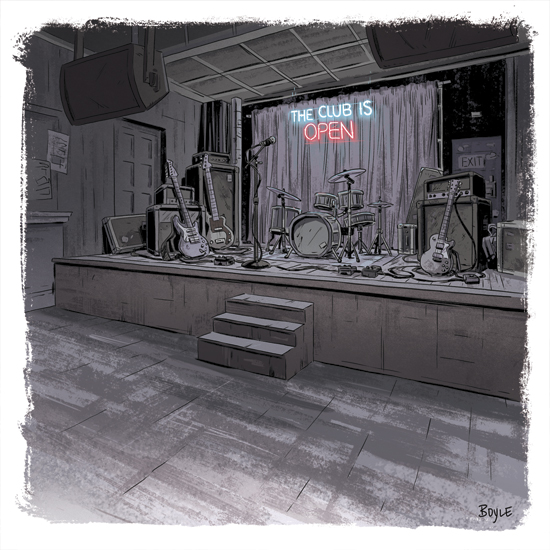
I don’t own a cellphone and can’t imagine why I would want to. I don’t spend hours staring at the internet, because the internet isn’t really there yet. Even though it’s 1993, I’m able to learn about cool new bands and keep track of when they’re coming to town. I go to shows and just watch them without feeling compelled to take a device out of my pocket and take photos or video.
It was during these forgotten, primitive conditions that I first encountered MAGNET. It was in a bookstore, and the issue I came upon had a short story about Uncle Tupelo, which was about my favorite band at the time. A few months later, I got an envelope in the mail at work.
It was from Eric T. Miller, the editor of MAGNET. It turns out the magazine was published in Philadelphia, my hometown. I was the sports columnist for a chain of suburban Philadelphia newspapers. Every now and then, I would mention a band in my column—Pavement, Uncle Tupelo—and Eric had recognized a fellow music obsessive. So he sent me issues of MAGNET, which was a little less well-produced than it is nowadays. It looked a little more like a really nicely laid-out zine, frankly.
I wrote back to Eric to thank him, and one thing led to another. Pretty soon, we were meeting at a show at Trenton’s City Garden. We hit it off, and next thing I knew, I was writing a column for the magazine. It was a fun time. MAGNET was writing features about the best bands of the era. Eric and I almost simultaneously discovered an Ohio band called Guided By Voices. We went together to a show at the Khyber Pass, then the best rock club in Philadelphia. We saw a skinny, middle-aged Robert Pollard acting out his arena-rock fantasies on the Khyber’s tiny stage. Those fantasies weren’t far off from my own teenage fantasies. Pollard and his band and his songs seemed like some kind of realization of those fantasies.
I loved GBV right away, but I could never have foreseen the way the band became identified with MAGNET or the number of encounters that link would create. I spent the rest of the ’90s and early 2000s going to GBV shows and rubbing elbows with Pollard and the rotating cast of band members. It was pretty great.
I’m thinking about all this because it all started a quarter of a century ago. MAGNET started 25 years ago. This is the 150th issue of the magazine. I’m still writing The Back Page column. The magazine is a lot slicker than it used to be, and the writing throughout is always really good. As much as the magazine has changed, though, it can’t compare to everything about the world the magazine covers.
This may sound like a complaint, and maybe it is, but I almost feel like we at MAGNET have become kind of like the staff at Downbeat or some other jazz magazine. We’re writing not about a current and vibrant art form, but more often we’re looking back on the happier past, when our music was fresh and new and exciting. When new artists are the subject, it feels almost like we’re fetishizing bands that make music that sounds like the stuff we loved so much from the ’90s.
Meanwhile, it feels like many of the current artists are trust-fund brats who have the money, time and freedom to dabble in cultural forms from a quarter-century ago. Picture some millennial opening a new bar that re-creates the feel and atmosphere of an old speakeasy, only with craft beer and a menu that includes locally sustainable meats and, of course, avocado toast. I might go in there and have a really good meal and a couple of drinks, but I wouldn’t be able to ignore the fact that it was a fundamentally artificial experience.
That’s how current indie-rock bands sound to me. Some of them sound pretty good, but they’re approximating a sound from another time. I saw dozens of bands in the 1990s—god, think of all the times I saw two opening bands just to get to a headlining band that I like—and one thing they almost all had in common was an authentic commitment to the music they were making. Maybe I was just a sucker and a lot of those bands were faking it, but I don’t think so.
Take a step back. There were bands in the ’90s that were doing their very best to recreate the sounds of bands from the ’60s or ’70s. I liked some of them, but there was that same sense of pantomime as we see so much today.
It’s tough. I mean, I would hate to be a young artist strumming a guitar in 2018. It feels like every chord progression and melody and lyrical idea has been covered and copied several times over. I’m not sure it’s possible for a band to sound as fresh and as original as GBV or Uncle Tupelo did to my ears in 1993.
And remember: I wasn’t a kid at that point. I was 30. I grew up going to see Bowie, the Stones, the Who and the Kinks. I had been a serious music fan for more than half my life, and I still got goosebumps the first time I saw GBV.
I don’t expect to have an experience like that again. Not now. MAGNET continues to write about worthwhile artists and to champion the few real standouts.
Hey, the staff over at Downbeat is always on the lookout for the next great horn player.
—Phil Sheridan





